Ethical Dilemma Analysis Report: Professional Environments, ACS Code
VerifiedAdded on 2020/05/28
|7
|1023
|1361
Report
AI Summary
This report presents an analysis of an ethical dilemma faced by a professional, Hardeep, who must choose between supporting a friend and acting in the best interest of his company. The report applies Macdonald's framework to navigate this conflict, considering stakeholders such as Hardeep, his friend Mandeep, and the government department. The analysis explores the values of trust and fairness, weighing the benefits and burdens of each decision. The report emphasizes the importance of adhering to the ACS Code of Ethics and the Corporations Act, which mandate acting in the best interest of the company and maintaining honesty. The conclusion recommends accepting the offer from Company A, aligning with legal and ethical guidelines, and includes a bibliography of relevant sources.
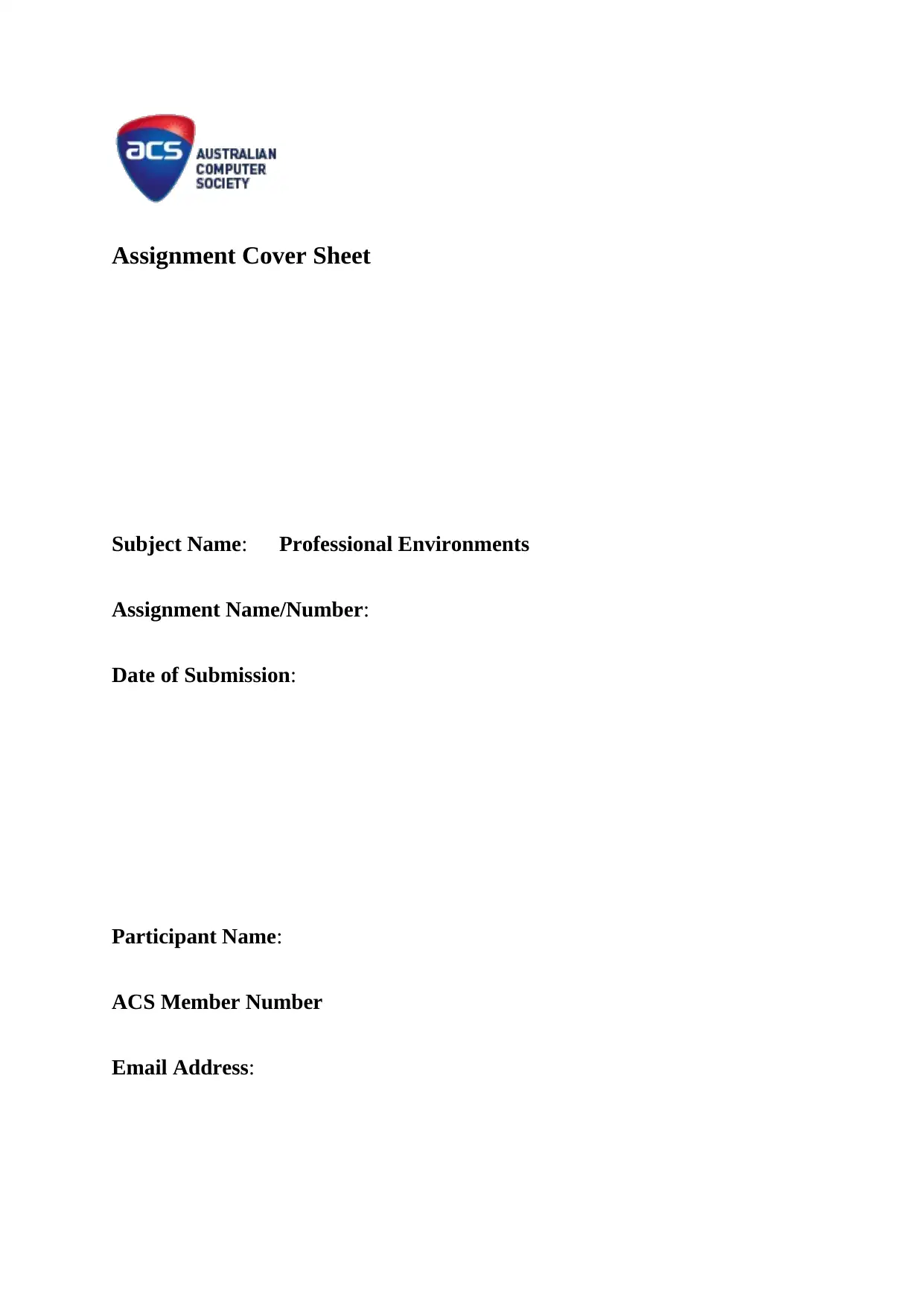
Assignment Cover Sheet
Subject Name: Professional Environments
Assignment Name/Number:
Date of Submission:
Participant Name:
ACS Member Number
Email Address:
Subject Name: Professional Environments
Assignment Name/Number:
Date of Submission:
Participant Name:
ACS Member Number
Email Address:
Paraphrase This Document
Need a fresh take? Get an instant paraphrase of this document with our AI Paraphraser
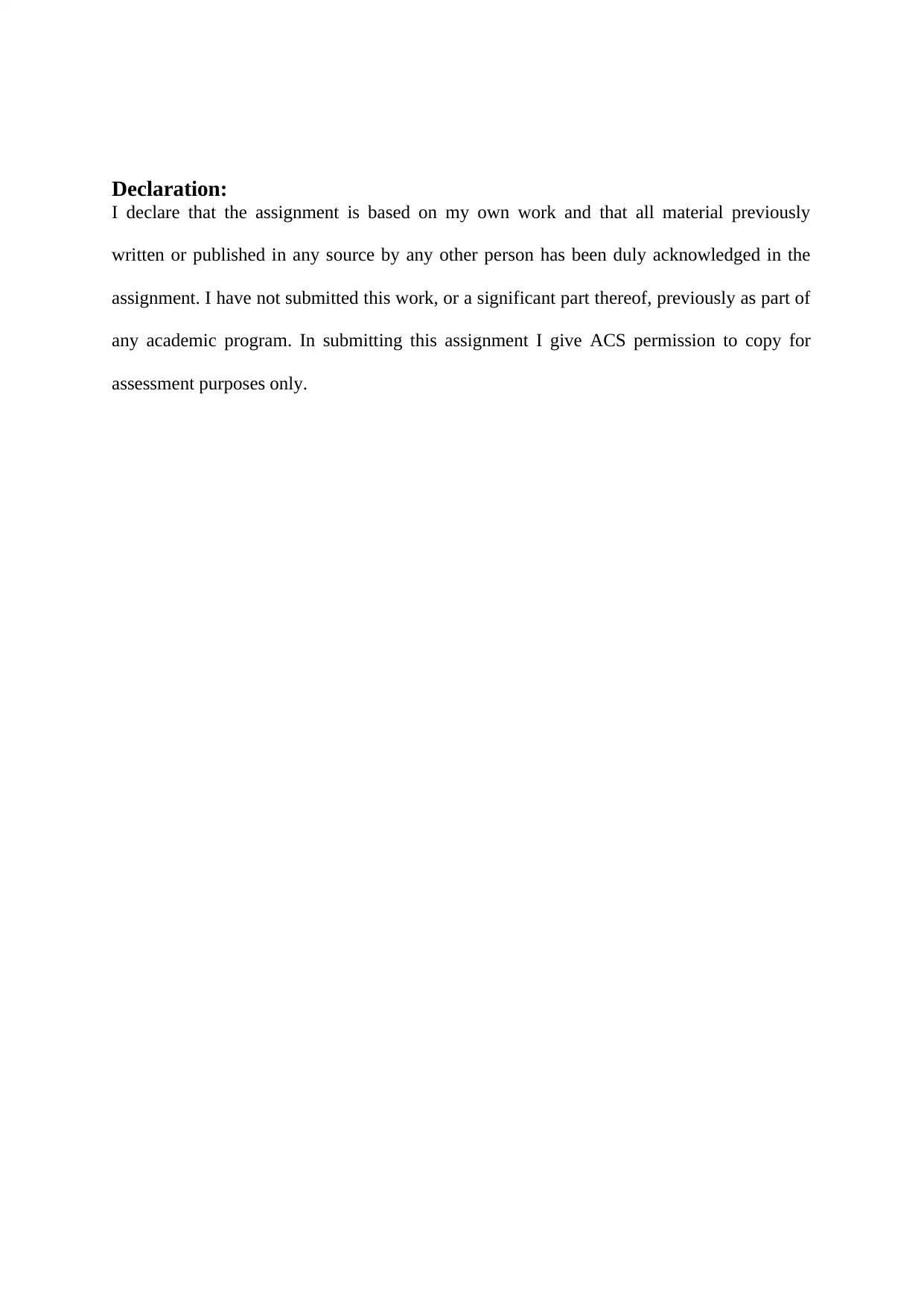
Declaration:
I declare that the assignment is based on my own work and that all material previously
written or published in any source by any other person has been duly acknowledged in the
assignment. I have not submitted this work, or a significant part thereof, previously as part of
any academic program. In submitting this assignment I give ACS permission to copy for
assessment purposes only.
I declare that the assignment is based on my own work and that all material previously
written or published in any source by any other person has been duly acknowledged in the
assignment. I have not submitted this work, or a significant part thereof, previously as part of
any academic program. In submitting this assignment I give ACS permission to copy for
assessment purposes only.
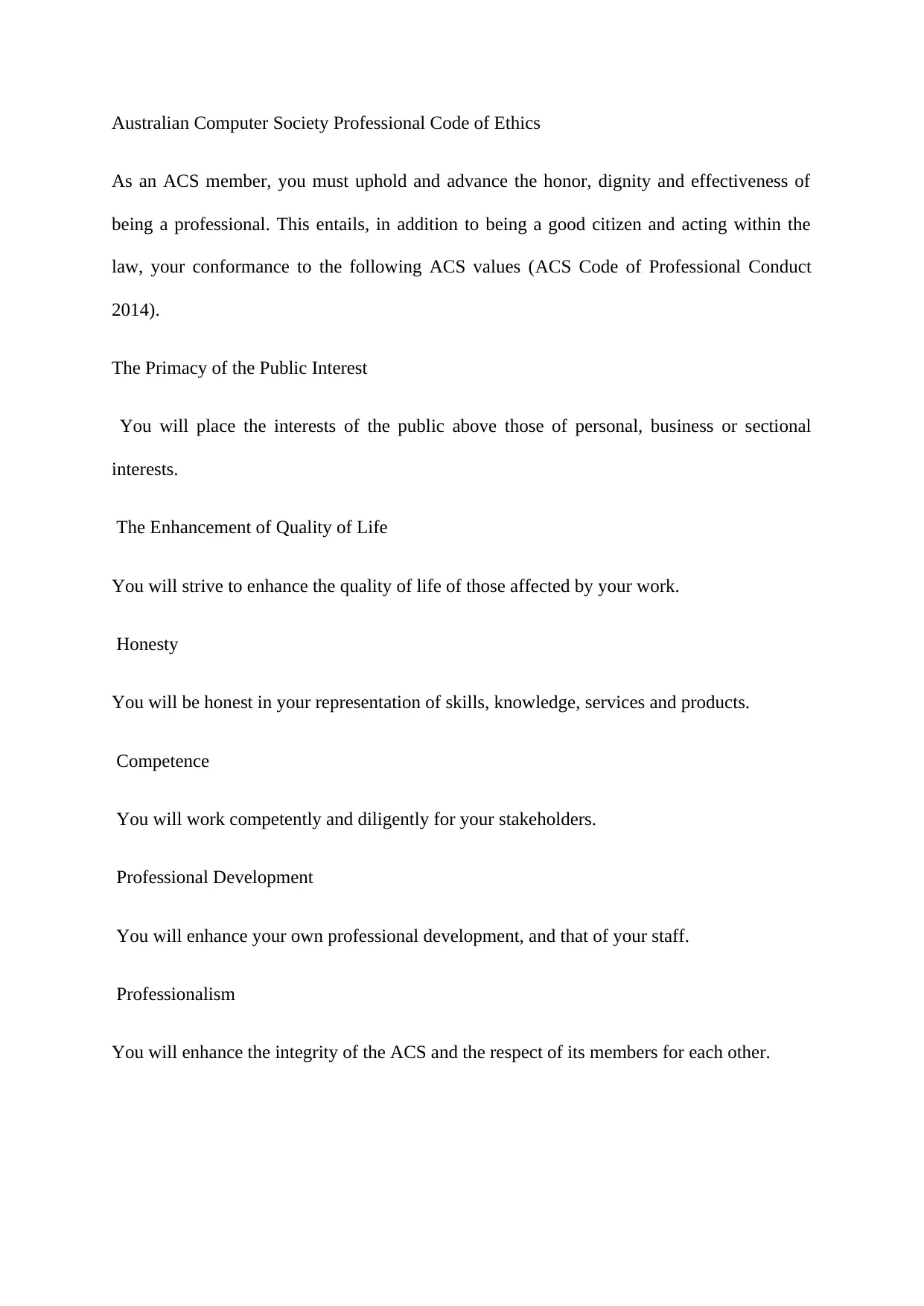
Australian Computer Society Professional Code of Ethics
As an ACS member, you must uphold and advance the honor, dignity and effectiveness of
being a professional. This entails, in addition to being a good citizen and acting within the
law, your conformance to the following ACS values (ACS Code of Professional Conduct
2014).
The Primacy of the Public Interest
You will place the interests of the public above those of personal, business or sectional
interests.
The Enhancement of Quality of Life
You will strive to enhance the quality of life of those affected by your work.
Honesty
You will be honest in your representation of skills, knowledge, services and products.
Competence
You will work competently and diligently for your stakeholders.
Professional Development
You will enhance your own professional development, and that of your staff.
Professionalism
You will enhance the integrity of the ACS and the respect of its members for each other.
As an ACS member, you must uphold and advance the honor, dignity and effectiveness of
being a professional. This entails, in addition to being a good citizen and acting within the
law, your conformance to the following ACS values (ACS Code of Professional Conduct
2014).
The Primacy of the Public Interest
You will place the interests of the public above those of personal, business or sectional
interests.
The Enhancement of Quality of Life
You will strive to enhance the quality of life of those affected by your work.
Honesty
You will be honest in your representation of skills, knowledge, services and products.
Competence
You will work competently and diligently for your stakeholders.
Professional Development
You will enhance your own professional development, and that of your staff.
Professionalism
You will enhance the integrity of the ACS and the respect of its members for each other.
⊘ This is a preview!⊘
Do you want full access?
Subscribe today to unlock all pages.

Trusted by 1+ million students worldwide
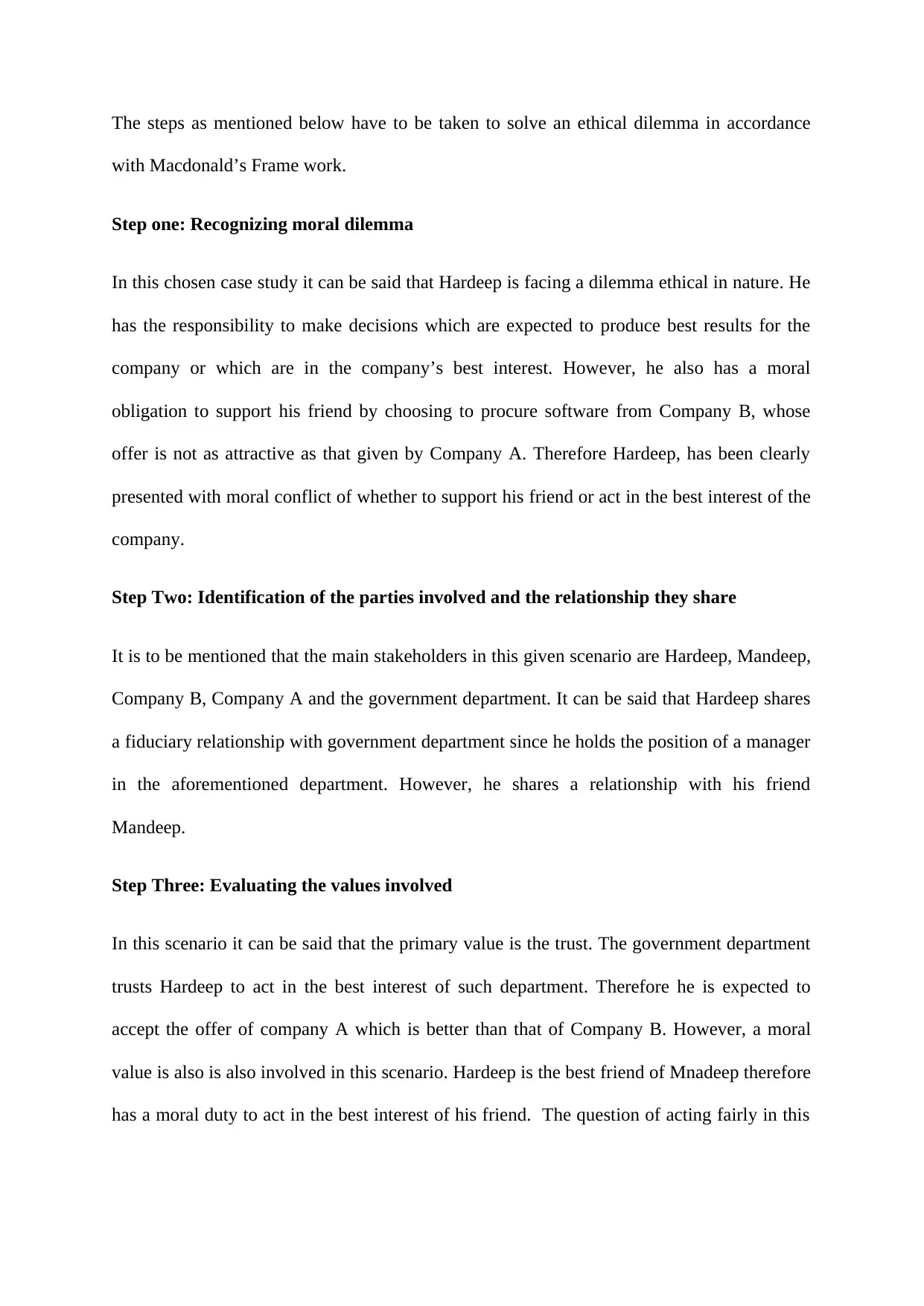
The steps as mentioned below have to be taken to solve an ethical dilemma in accordance
with Macdonald’s Frame work.
Step one: Recognizing moral dilemma
In this chosen case study it can be said that Hardeep is facing a dilemma ethical in nature. He
has the responsibility to make decisions which are expected to produce best results for the
company or which are in the company’s best interest. However, he also has a moral
obligation to support his friend by choosing to procure software from Company B, whose
offer is not as attractive as that given by Company A. Therefore Hardeep, has been clearly
presented with moral conflict of whether to support his friend or act in the best interest of the
company.
Step Two: Identification of the parties involved and the relationship they share
It is to be mentioned that the main stakeholders in this given scenario are Hardeep, Mandeep,
Company B, Company A and the government department. It can be said that Hardeep shares
a fiduciary relationship with government department since he holds the position of a manager
in the aforementioned department. However, he shares a relationship with his friend
Mandeep.
Step Three: Evaluating the values involved
In this scenario it can be said that the primary value is the trust. The government department
trusts Hardeep to act in the best interest of such department. Therefore he is expected to
accept the offer of company A which is better than that of Company B. However, a moral
value is also is also involved in this scenario. Hardeep is the best friend of Mnadeep therefore
has a moral duty to act in the best interest of his friend. The question of acting fairly in this
with Macdonald’s Frame work.
Step one: Recognizing moral dilemma
In this chosen case study it can be said that Hardeep is facing a dilemma ethical in nature. He
has the responsibility to make decisions which are expected to produce best results for the
company or which are in the company’s best interest. However, he also has a moral
obligation to support his friend by choosing to procure software from Company B, whose
offer is not as attractive as that given by Company A. Therefore Hardeep, has been clearly
presented with moral conflict of whether to support his friend or act in the best interest of the
company.
Step Two: Identification of the parties involved and the relationship they share
It is to be mentioned that the main stakeholders in this given scenario are Hardeep, Mandeep,
Company B, Company A and the government department. It can be said that Hardeep shares
a fiduciary relationship with government department since he holds the position of a manager
in the aforementioned department. However, he shares a relationship with his friend
Mandeep.
Step Three: Evaluating the values involved
In this scenario it can be said that the primary value is the trust. The government department
trusts Hardeep to act in the best interest of such department. Therefore he is expected to
accept the offer of company A which is better than that of Company B. However, a moral
value is also is also involved in this scenario. Hardeep is the best friend of Mnadeep therefore
has a moral duty to act in the best interest of his friend. The question of acting fairly in this
Paraphrase This Document
Need a fresh take? Get an instant paraphrase of this document with our AI Paraphraser
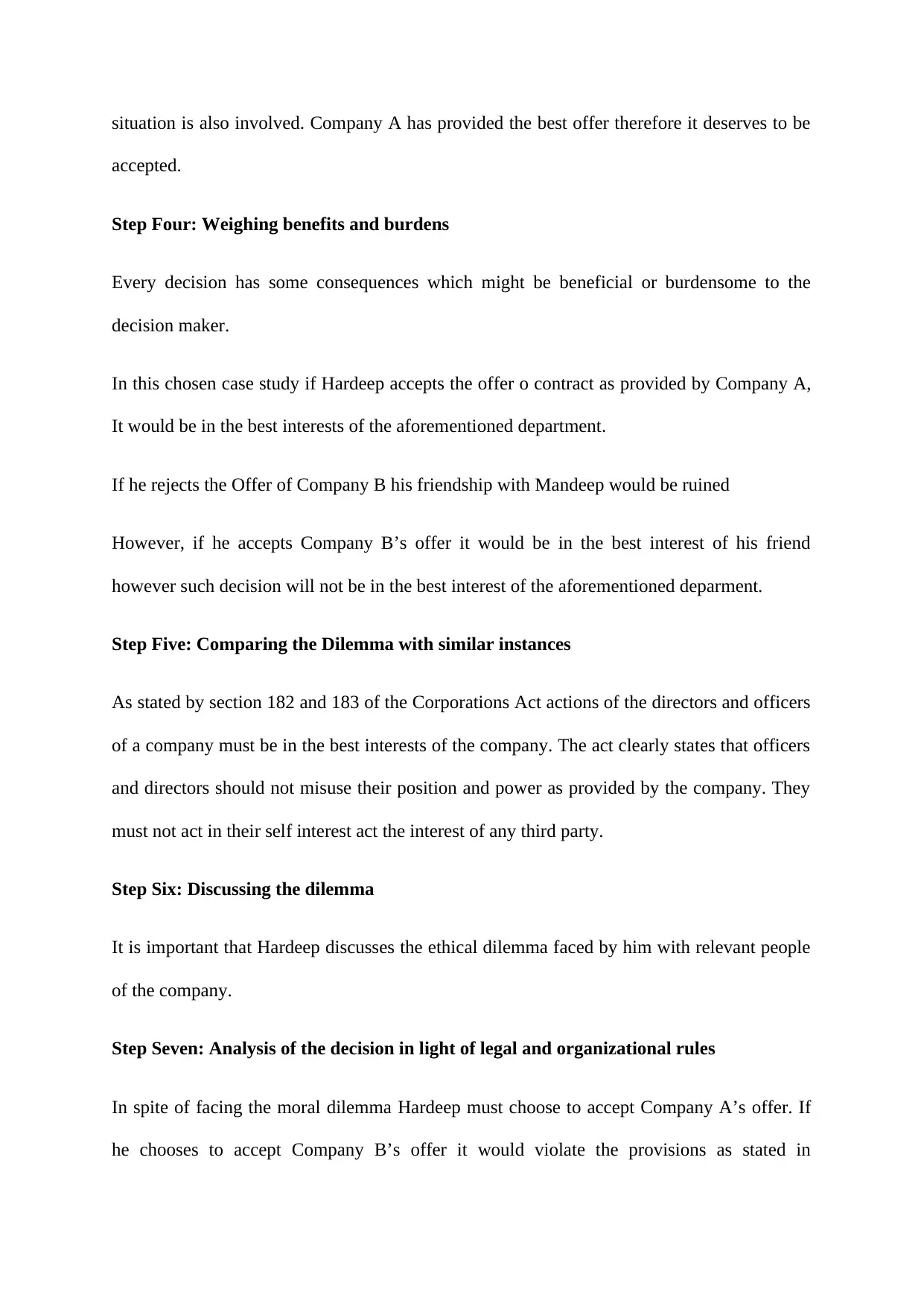
situation is also involved. Company A has provided the best offer therefore it deserves to be
accepted.
Step Four: Weighing benefits and burdens
Every decision has some consequences which might be beneficial or burdensome to the
decision maker.
In this chosen case study if Hardeep accepts the offer o contract as provided by Company A,
It would be in the best interests of the aforementioned department.
If he rejects the Offer of Company B his friendship with Mandeep would be ruined
However, if he accepts Company B’s offer it would be in the best interest of his friend
however such decision will not be in the best interest of the aforementioned deparment.
Step Five: Comparing the Dilemma with similar instances
As stated by section 182 and 183 of the Corporations Act actions of the directors and officers
of a company must be in the best interests of the company. The act clearly states that officers
and directors should not misuse their position and power as provided by the company. They
must not act in their self interest act the interest of any third party.
Step Six: Discussing the dilemma
It is important that Hardeep discusses the ethical dilemma faced by him with relevant people
of the company.
Step Seven: Analysis of the decision in light of legal and organizational rules
In spite of facing the moral dilemma Hardeep must choose to accept Company A’s offer. If
he chooses to accept Company B’s offer it would violate the provisions as stated in
accepted.
Step Four: Weighing benefits and burdens
Every decision has some consequences which might be beneficial or burdensome to the
decision maker.
In this chosen case study if Hardeep accepts the offer o contract as provided by Company A,
It would be in the best interests of the aforementioned department.
If he rejects the Offer of Company B his friendship with Mandeep would be ruined
However, if he accepts Company B’s offer it would be in the best interest of his friend
however such decision will not be in the best interest of the aforementioned deparment.
Step Five: Comparing the Dilemma with similar instances
As stated by section 182 and 183 of the Corporations Act actions of the directors and officers
of a company must be in the best interests of the company. The act clearly states that officers
and directors should not misuse their position and power as provided by the company. They
must not act in their self interest act the interest of any third party.
Step Six: Discussing the dilemma
It is important that Hardeep discusses the ethical dilemma faced by him with relevant people
of the company.
Step Seven: Analysis of the decision in light of legal and organizational rules
In spite of facing the moral dilemma Hardeep must choose to accept Company A’s offer. If
he chooses to accept Company B’s offer it would violate the provisions as stated in
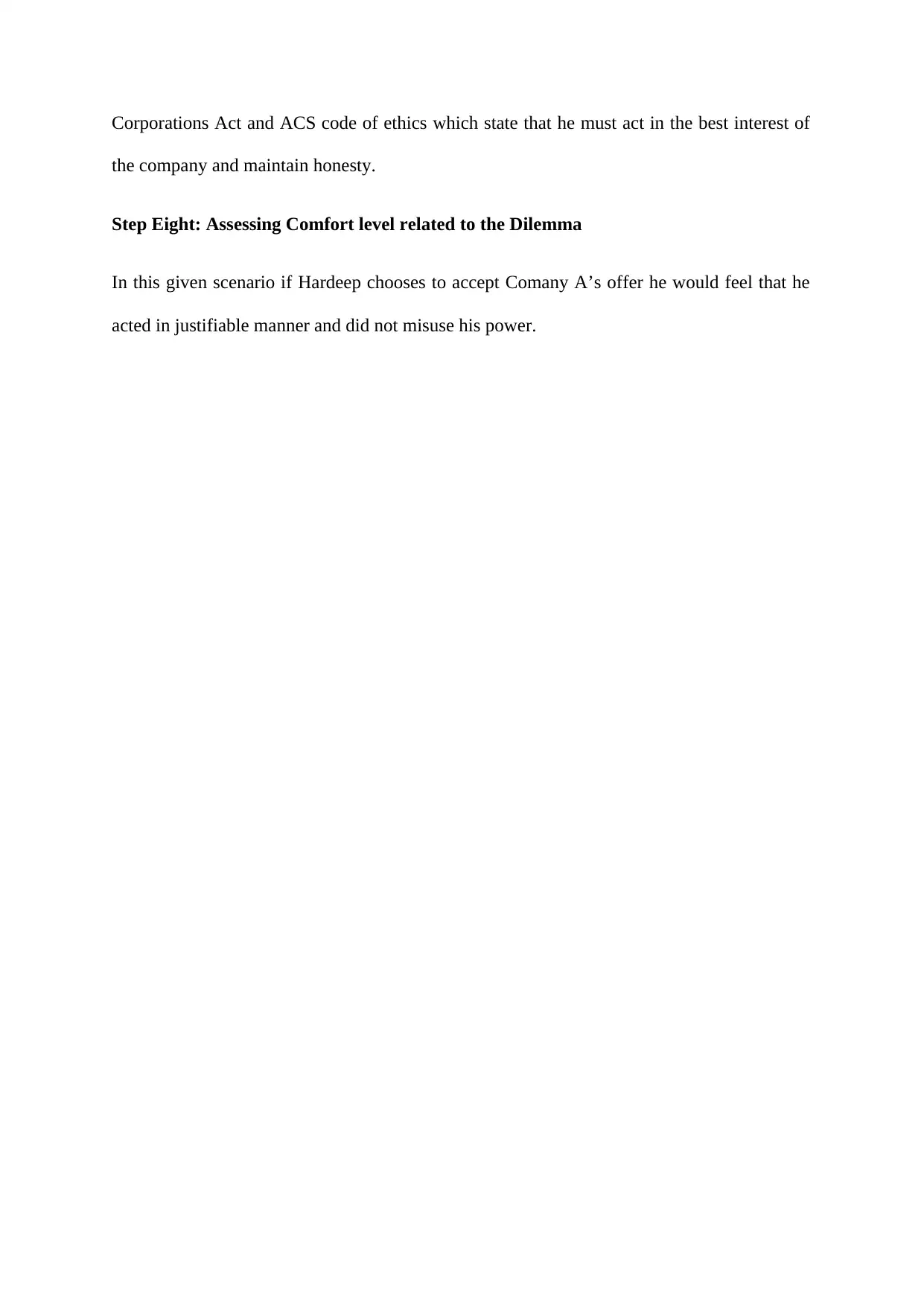
Corporations Act and ACS code of ethics which state that he must act in the best interest of
the company and maintain honesty.
Step Eight: Assessing Comfort level related to the Dilemma
In this given scenario if Hardeep chooses to accept Comany A’s offer he would feel that he
acted in justifiable manner and did not misuse his power.
the company and maintain honesty.
Step Eight: Assessing Comfort level related to the Dilemma
In this given scenario if Hardeep chooses to accept Comany A’s offer he would feel that he
acted in justifiable manner and did not misuse his power.
⊘ This is a preview!⊘
Do you want full access?
Subscribe today to unlock all pages.

Trusted by 1+ million students worldwide
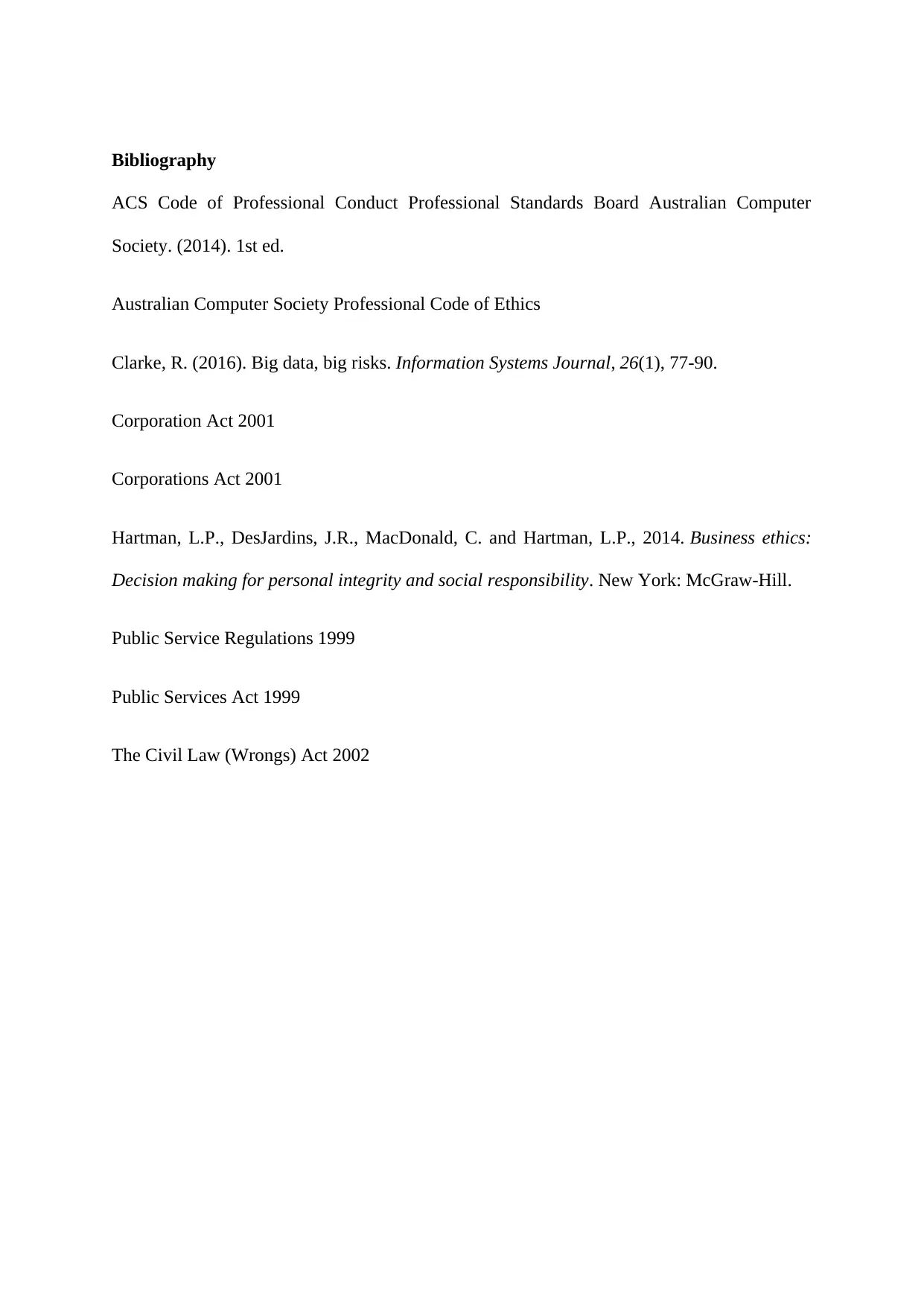
Bibliography
ACS Code of Professional Conduct Professional Standards Board Australian Computer
Society. (2014). 1st ed.
Australian Computer Society Professional Code of Ethics
Clarke, R. (2016). Big data, big risks. Information Systems Journal, 26(1), 77-90.
Corporation Act 2001
Corporations Act 2001
Hartman, L.P., DesJardins, J.R., MacDonald, C. and Hartman, L.P., 2014. Business ethics:
Decision making for personal integrity and social responsibility. New York: McGraw-Hill.
Public Service Regulations 1999
Public Services Act 1999
The Civil Law (Wrongs) Act 2002
ACS Code of Professional Conduct Professional Standards Board Australian Computer
Society. (2014). 1st ed.
Australian Computer Society Professional Code of Ethics
Clarke, R. (2016). Big data, big risks. Information Systems Journal, 26(1), 77-90.
Corporation Act 2001
Corporations Act 2001
Hartman, L.P., DesJardins, J.R., MacDonald, C. and Hartman, L.P., 2014. Business ethics:
Decision making for personal integrity and social responsibility. New York: McGraw-Hill.
Public Service Regulations 1999
Public Services Act 1999
The Civil Law (Wrongs) Act 2002
1 out of 7
Related Documents
Your All-in-One AI-Powered Toolkit for Academic Success.
+13062052269
info@desklib.com
Available 24*7 on WhatsApp / Email
![[object Object]](/_next/static/media/star-bottom.7253800d.svg)
Unlock your academic potential
Copyright © 2020–2026 A2Z Services. All Rights Reserved. Developed and managed by ZUCOL.





